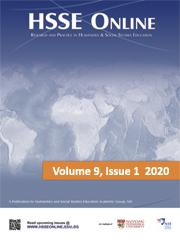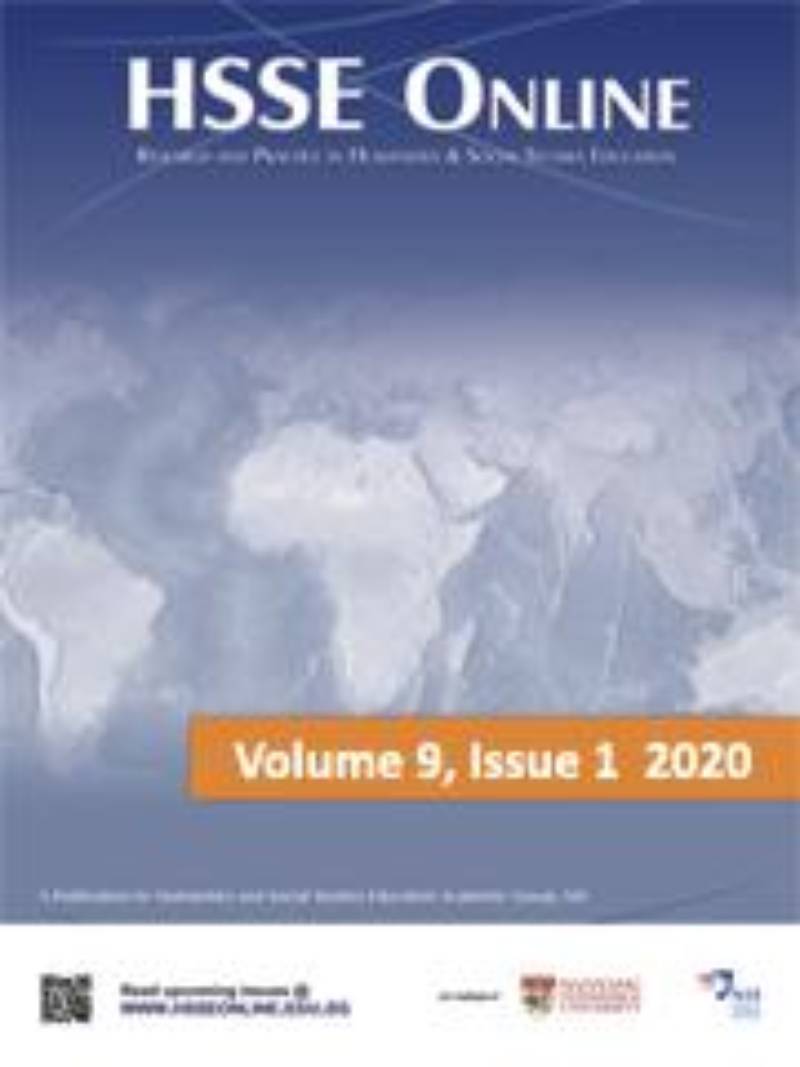HSSE Online is published by the HSSE Academic Group, National Institute of Education (NIE), Singapore. The overarching purpose of the journal is to energize, inform and improve teaching practice in Humanities and Social Studies education in Singapore and to provide a venue to share ideas, research and resources that will be useful to teachers and scholars.
We seek to develop and deepen knowledge and understanding of powerful and innovative research and practice in Humanities and Social Studies education. We hope you will make use of these ideas and resources as well as contribute your own.

Featured Articles
The Pedagogical Affordances of Game-Based Learning: “Getting To Zero” And Pro-Environmental Action
Ong Zhiqing(National Institute of Education (Singapore)) Keywords Geography Junior College Secondary School In light of concerns over global warming, environmental education has been touted as a means of raising environmental consciousness and effecting transformative change. This paper evaluates the pedagogical affordances of gamification or game based learning in motivating pro-environmental action. In particular, this paper […]
Ong Zhiqing(National Institute of Education (Singapore))
Keywords
Geography
Junior College
Secondary School
In light of concerns over global warming, environmental education has been touted as a means of raising environmental consciousness and effecting transformative change. This paper evaluates the pedagogical affordances of gamification or game based learning in motivating pro-environmental action. In particular, this paper focuses on the role that a physical card game called “Getting to Zero” can play in educating students about the trade-offs that Singapore faces in order to achieving net-zero emissions. It also offers some recommendations on how educators can better incorporate this game in the classroom.
Climate Change Education In Singapore: A Survey of Science Teachers
Goh Xin Fang (National Institute of Education (Singapore)) Keywords Geography Junior College Secondary School Action has been taken by governments and international organisations to address the global implications of climate change brought about by economic development that is unsustainable. In Singapore, climate change education is one of the numerous strategies mobilised by the state to mitigate […]
Goh Xin Fang (National Institute of Education (Singapore))
Keywords
Geography
Junior College
Secondary School
Action has been taken by governments and international organisations to address the global implications of climate change brought about by economic development that is unsustainable. In Singapore, climate change education is one of the numerous strategies mobilised by the state to mitigate the negative effects of global warming. Climate change education is featured in the country’s Science and Geography secondary school curriculum. Meanwhile, this study aims to investigate what in-service Chemistry secondary school teachers think about their teaching practice and the outcomes of climate change education. The findings of this study can hopefully provide recommendations for strengthening Climate Change Education in Singapore.
Teachers’ Perceptions of Climate Change Induced Heat Stress and Related Heat Management Strategies In Singapore’s Schools
Karina Lalchand Sheri (National Institute of Education (Singapore)) Keywords Geography Junior College Secondary School Global warming is palpable in Singapore. Given that most classrooms in the country are largely affected by rising ambient temperatures, students are susceptible to heat stress, which undermines their learning productivity. This qualitative study sought to understand what six secondary school teachers […]
Karina Lalchand Sheri (National Institute of Education (Singapore))
Keywords
Geography
Junior College
Secondary School
Global warming is palpable in Singapore. Given that most classrooms in the country are largely affected by rising ambient temperatures, students are susceptible to heat stress, which undermines their learning productivity. This qualitative study sought to understand what six secondary school teachers in Singapore thought about the adverse effects that climate change induced warming can have on their students’ learning. While thermal discomfort was a real issue to contend with, this study found that its effects on productivity varied across time, from student to student, and among schools. Instead of relying on cooling methods that involved the further use of energy/resources for temporary thermal relief, the recommendations/strategies for dealing with heat stress mentioned by the teachers were far more sustainable and contextually specific.
Mega Dams and Their Impacts On Downstream Sand Bar and Island Dynamics Along The Madeira River, Brazil
Karina Lalchand Sheri (National Institute of Education (Singapore)) Keywords Geography Junior College Secondary School This paper investigates the impact of both Santo Antônio and Jirau mega dams on the downstream geomorphology of, more specifically, island and bar dynamics along the Madeira River in the Amazon. Water level data from gauge stations and remote sensing images from […]
Karina Lalchand Sheri (National Institute of Education (Singapore))
Keywords
Geography
Junior College
Secondary School
This paper investigates the impact of both Santo Antônio and Jirau mega dams on the downstream geomorphology of, more specifically, island and bar dynamics along the Madeira River in the Amazon. Water level data from gauge stations and remote sensing images from 1990 to 2019 were deployed to make sense of the changes in the number, area and volume of islands/bars downstream of the dams. The data indicated that both Santo Antônio and Jirau, which are run-of-river dams have not had significant impacts on the area and volume of islands/bars found in Madeira River’s five reaches. A reduction in the volume of islands/bars was marginally more substantial than a negligible reduction in their areal extent. Trapped sediments behind both dams could have accounted for the slight decrease in island/bar volume. Overall, this paper opens up a discussion on the sustainability of fluvial/geomorphological features and water regimes, alongside the installation of run-of-river dams as an allegedly more sustainable alternative to other kinds of hydraulic structures and non-renewable sources of energy. Student-teachers who are taking tertiary courses in physical Geography, as well as A Level Geography educators are likely to take interest in this in-depth and well contextualised case study of mega dams in Brazil.
Single-Use Plastics: A Survey of Pre-Service Secondary School Teachers In Singapore
Jean Lim Le Hui (National Institute of Education (Singapore)) Keywords Geography Junior College Secondary School The excessive use of disposable plastics coupled with Singapore’s low 4% recycling rate of plastic waste renders this a significant environmental problem (National Environment Agency 2022). It is widely acknowledged that public school teachers play a crucial role in inculcating environmentally […]
Jean Lim Le Hui (National Institute of Education (Singapore))
Keywords
Geography
Junior College
Secondary School
The excessive use of disposable plastics coupled with Singapore’s low 4% recycling rate of plastic waste renders this a significant environmental problem (National Environment Agency 2022). It is widely acknowledged that public school teachers play a crucial role in inculcating environmentally sustainable best practices among their students. However, this paper demonstrates that (pre-service) teachers in Singapore are often not adequately equipped with the necessary knowledge to be effective environmental educators. It argues that a more rigorous teacher training program with an emphasis on eco-pedagogy, alongside an eco-centric curriculum can help with the management of plastic waste on a national level.
Search
News & Announcements
The Practice of Economics Teaching at Junior College Level
Learning of and Learning for Urban Liveability
Controversial History Education in Asian Contexts – A Discussion
Quick Index
- HSSEOnline Vol.9, 2020
- HSSEOnline Vol.8, 2019
- HSSEOnline Vol.7, 2019
- HSSEOnline Vol.6, 2019
- HSSEOnline Vol.5, 2019
- HSSEOnline Vol.4, 2019
- HSSEOnline Vol.3, 2019
- HSSEOnline Vol.2, 2019
- HSSEOnline Vol.1, 2019


